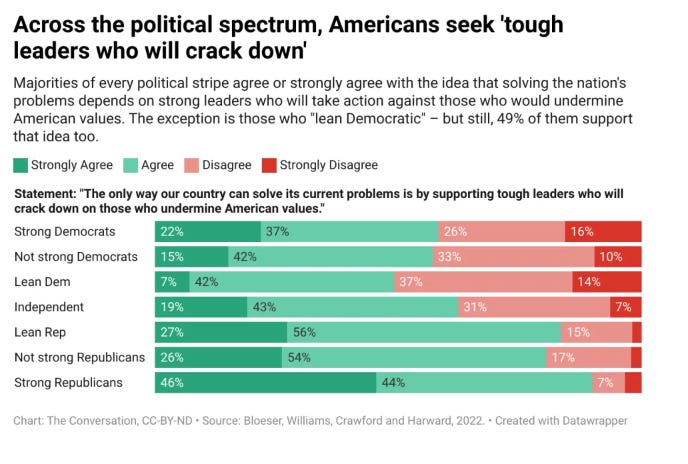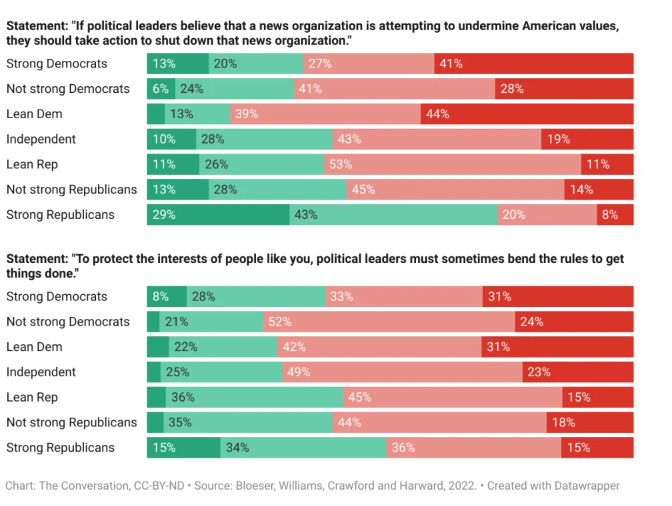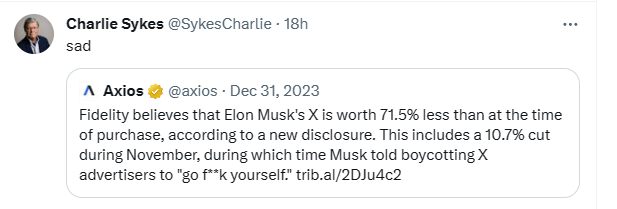“Men will not accept truth at the hands of their enemies, and truth is seldom offered to them by their friends.” ―Alexis de Tocqueville, Democracy in America
Welcome to 2024. As my friend Ben Wittes notes in his excellent New Year’s edition of his Dog Shirt Daily newsletter, “By this time next year, American democracy will either be ending or will have dealt a dramatic blow to its foes. It’s Götterdämmerung in Trump’s war against the world’s most powerful office.”
So this seems like a good time to talk about what we mean by “American democracy,” which we’ll get to in a moment.
But first we need to look back on 2023’s Word of the Year. Merriam-Webster has chosen “authentic,” but we beg to differ.
The uncontested Word of 2023 has to be “enshittification.” All credit for this brilliant neologism goes to Cory Doctorow, who applied it to certain well-known social media sites:
Here is how platforms die: first, they are good to their users; then they abuse their users to make things better for their business customers; finally, they abuse those business customers to claw back all the value for themselves. Then, they die.
I call this enshittification. . . .
At the time, Doctorow was writing about TikTok, but it applies with equal if not greater force to the Muskified Xitter and, indeed, to much of what we call the internet as a whole. As Baratunde Thurston predicts, it is all getting worse.
Our Google searches, Amazon shopping experiences, and social media feeds feel less relevant and more filled with algorithmically and financially manipulated junk results . . . because they are. . . .
On the one hand, generative A.I. can more quickly filter through the noise, and offer up more relevant results. But the explosion of A.I. will also contribute to the problem by flooding the internet with more junk content all while reducing traffic (and ad dollars) that previously flowed to the sites that host genuine, accurate, human-generated information. As quality data becomes more scarce—or expensive—A.I. operators will turn to “synthetic data” to train their models, making the “enshittification” more literal as machines ingest their own digital effluent.
With half the world holding national elections in 2024, we’re all in for a rough, disinformation-fueled ride.
Happy New Year.
We’re not a democracy. And that’s important to understand.
Pardon the pedantry, but we need to talk about this.
In the wake of decisions in Colorado and Maine to disqualify Donald Trump from the ballot, critics on both the right and left have rushed to declare the decisions “anti-democratic.”
In the NYT, Ross Douthat struck the note of ironic punditry: “The Anti-Democratic Quest to Save Democracy from Trump.” Douthat complains that removing a candidate from the ballot — “indeed, a candidate currently leading in some polling averages” — through the courts “is a remarkably antidemocratic act.”
Over at the Free Press former GOP congressman and onetime Trump opponent Peter Meijer continued his campaign to win back the favor of Mar-a-Lago by arguing that (as the title of his article puts it) the Colorado ruling “undermines democracy in the name of democracy”:
In efforts to “protect democracy” from Trump, those who view Trump as a threat to democracy are defiling democratic norms in the process. At every turn, they reinforce the worst suspicions of the public that our system is rigged.
Center-left Trump critic Jonathan Chait struck a similar note, complaining that Colorado has gone too far.
To deny the voters the chance to elect the candidate of their choice is a Rubicon-crossing event for the judiciary. It would be seen forever by tens of millions of Americans as a negation of democracy.
Even Democrats who oppose Trump are focusing on the anti-democratic element of using the Fourteenth Amendment to remove Trump from the ballot.
“Would Keeping Trump Off the Ballot Hurt or Help Democracy?” the New York Times asked in its own pearl-clutching seminar.
As the top elections official in Washington State, Steve Hobbs says he is troubled by the threat former President Donald J. Trump poses to democracy and fears the prospect of his return to power. But he also worries that recent decisions in Maine and Colorado to bar Mr. Trump from presidential primary ballots there could backfire, further eroding Americans’ fraying faith in U.S. elections.
“Removing him from the ballot would, on its face value, seem very anti-democratic,” said Mr. Hobbs, a Democrat who is in his first term as secretary of state. Then he added a critical caveat: “But so is trying to overthrow your country.”
**
Because there are multitudes of brilliant legal analysts out there, I’m not going to try to litigate the arguments about whether the Fourteenth Amendment’s ban on insurrectionists applies to Trump.
But I do think it’s important to provide some clarity on this matter of “democracy.”
And I apologize in advance for reiterating arguments that probably already bore you to tears.
The United States is a republic not a democracy.
I know. I know. If you bring this up at a party, folks will suddenly recall that they have an emergency flossing appointment.
So “democracy” has become the default term for our system of government — and a rallying cry for its defenders. (I have certainly been part of that, serving as an adviser to the Democracy Fund, and serving for five minutes as the president of the Defending Democracy Together Institute.)
But words matter, especially now: When we talk about the defending democracy, what we really mean is liberal constitutional republicanism. (If you prefer “liberal constitutional democracy” or “representative democracy,” fine.)
We are not and never have been a democracy.
Indeed, skepticism of democracy is at the heart of the Constitution, which draws high walls around the power of majority rule. The Founders were careful students of its fraught history.
“Remember,” wrote John Adams, “Democracy never lasts long. It soon wastes exhausts and murders itself. There never was a Democracy Yet, that did not commit suicide. It is in vain to Say that Democracy is less vain, less proud, less selfish, less avaricious than Aristocracy or Monarchy.”
The architect of the Constitution, James Madison warned that “Democracy was the right of the people to choose their own tyrant.”
“Democracies,” he wrote in Federalist No. 10, “have ever been spectacles of turbulence and contention; have ever been found incompatible with personal security, or the rights of property; and have in general been as short in their lives, as they have been violent in their deaths.”
Alexander Hamilton pushed back against the argument that “pure democracy” was “the most perfect government.” And, again, he looked to history and experience:
Experience has proved, that no position in politics is more false than this. The ancient democracies, in which the people themselves deliberated, never possessed one feature of good government. Their very character was tyranny; their figure deformity: When they assembled, the field of debate presented an ungovernable mob, not only incapable of deliberation, but prepared for every enormity.
Along with the other Founders, Hamilton recognized that “democracy” was not incompatible with demagogic populism. “Real liberty is neither found in despotism or the extremes of democracy,” he argued, “but in moderate governments.”
The “moderate” government, he described, was of course, the one that emerged in the Constitution, with its checks and balances and separation of powers. It was a government that was based on the rule of law rather than rule by majoritarian factions.
All of those undemocratic hedges and limits have long been frustrating to critics, including progressives, but it is important to recognize that this is, in fact, the system we have.
**
Which brings us back to the complaints about the use of the Fourteenth Amendment to disqualify the former president. I tend to agree with critics who think the move will backfire and is politically unwise.
But is it anti-democratic?
The argument that removing Trump from the ballot is an attack on democracy is bumper-sticker punditry, but it is a plausible argument if we define democracy as majoritarian rule or a system in which the demos gets what the heart of the demos wants.
It is also worthwhile to make distinctions between things that are anti-democratic and those that are simply non-democratic. As Jonah Goldberg recently observed:
[It would be] nice if people didn’t conflate anti-democratic with non-democratic. There’s plenty of stuff in our system that everyone loves that is non-democratic. That doesn’t make it anti-democratic. Courts are mostly non-democratic, but they’re essential to sustaining democracy.
His colleague at the Dispatch, Nick Cataggio also addressed the argument that “it’s improper to use the Constitution itself to punish him because to do so would be “anti-democratic.”
But it isn’t, of course.
The whole point of a constitutional republic is to circumscribe democracy in certain circumstances. The Constitution is itself the most exalted expression of the will of We the People, in fact, by dint of its supermajority requirements for ratification and amendment. Which means sometimes, by design, the majority doesn’t get its way.
Likewise, our system would not allow a majority of voters to repeal any of the Bill of Rights. Not even a supermajority of the demos would be able to recriminalize gay sex, ban the practice of Islam, ban the possession of guns, or make reading books a felony.
Writes Catoggio:
A state might pass a law banning flag burning and that law might enjoy strong support, but it’s going straight into the dumpster in court because the First Amendment trumps the majority’s will. That’s “anti-democratic.”
It’s likewise “anti-democratic” for Congress to remove the duly elected president for high crimes and misdemeanors, as we were told repeatedly by Trump apologists during the final year of his term, yet the Constitution grants that power too. And the Constitution requires candidates for president to be at least 35 years old and natural-born citizens of the United States, which means no matter how much you might want to vote for a 34-year-old . . . your vote won’t count. Also quite “anti-democratic.”
**
If irony was not also long dead, it might be worth pointing out that MAGA’s complaints about the attack on democracy are flaming balls of piffle.
They insist (as do some Trump opponents) that the former president’s fate should be decided at the ballot box, not the courts.
But that’s the point, isn’t it?
Trump was, in fact, defeated at the polls, and he attempted to overturn that result. There is no reason to believe that he will accept any democratic verdict that does not put him back into power.
If that is not disqualifying, what is?
**
But, apparently, insurrection is not disqualifying for GOP voters.
This would have alarmed the Founders, of course, but it has also taken contemporaries by surprise.
Mitch McConnell did not think convicting Trump necessary because he assumed that the voters would clean up the mess; Ron DeSantis premised his candidacy on the belief that GOP primary voters would be repelled by Trump’s felonies.
In part, that ill-placed faith in the demos (or at least the GOP demos) explains the failure of legal and political institutions to hold Trump accountable until now.
They counted on democracy to save us.
How naïve.
The threat to liberal constitutional republicanism
Unfortunately, there is more evidence that the constant invocation of “democracy” might not be enough to save the Republic.
A recent survey of a nationally representative sample of 1,500 respondents “found that a large proportion of Americans are willing to support leaders who would violate democratic principles.”
“Large numbers of Americans want a strong, rough, anti-democratic leader.”
In our study, we asked about behaviors that foreshadow the early stages of democratic decline. For example, we asked citizens whether they thought that “the only way our country can solve its current problems is by supporting tough leaders who will crack down on those who undermine American values.” We also asked about explicit violations of democratic principles, like shutting down news organizations and “bending the rules to get things done.”
..
We found that people who want this type of protective but anti-democratic style of leadership were by far the most inclined to want leaders who would take uncompromising, decisive action. These people did not merely want their side to win a political competition for power. They were literally willing to say they would “bend the rules” to do it, a clear violation of the democratic ideal that everyone must follow the same rules.
For each item, we found that at least a third of the people we polled agreed or strongly agreed with these subtle or explicit violations of democratic norms.
Quick Hits
1. The Threat from Trump Today Is Worse Than on January 6th
Bill Kristol and Jeffrey Tulis in The Bulwark:
One might believe that, if we could survive the challenge of January 6th, when we were on the precipice of imminent democratic failure, surely the challenges to constitutional democracy that we face today will be easier to overcome.
We wish this were so. But the fact is that the United States is closer to constitutional failure today than it was three years ago.
2. Christie Can’t Endorse Haley Now
A.B. Stoddard in today’s Bulwark:
Many Republicans have hoped, since Christie defended Haley against attacks from Vivek Ramaswamy at the last debate, that he would come around and endorse her in the end.
But Christie isn’t buckling twice. Credited with having helped smooth the path for Trump’s nomination in 2016, he has now gone all in on trashing his former friend and is clearly determined to spend every remaining day telling the truth about Trump’s lies, corruption, and crimes. Dropping out to clear the field would mean supporting a candidate he knows is going to lose to Trump anyway, and who refuses to tell that truth.
Haley is a talented, smart, ambitious, hypocritical phony. And she is going to endorse Trump. And if he asks her to be his running mate she is going to accept. So backing Haley would defeat the purpose of Christie’s campaign, which is to truth-bomb the GOP, injure Trump, and redeem himself.
3. The Huge Legal Questions Ahead in 2024
AT THIS POINT, THE ODDS ARE STRONG that the federal trials could be pushed into the summer. Meanwhile, the final state primaries are slated to occur on June 4, with the Republican National Convention scheduled for July 15 to 18 in Milwaukee. There’s no federal deadline for seeking the nomination of a major party, but states’ various requirements wrap up in March. At that point, unless the January 6th case’s trial date holds, Republican party leaders and donors won’t know much more than the rest of us when it comes to whether their pick for 2024, Donald J. Trump, can add “felon” to his resume.









Trump disqualified himself. Under the constitution, a foreign born person or a person under 35 fails to meet the qualifications through accident of birth. Under the same document, one can be disqualified by deliberate criminal acts aimed at overturning the government. Whether the courts are willing to apply the rule or yet again, give Trump special favoritism is the only question.
There is simply no scenario in which Trump is not reinstalled as President for life, in which his camp does not cry foul and claim a colossal miscarriage of justice. Whether he's disqualified from the ballot, convicted and incarcerated, or defeated in November, his people have a ready-made excuse and exercise of his terminal persecution complex.
There is no way to keep him out of office that they will accept. Period. So stop worrying about them.